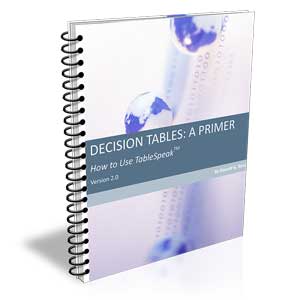Legacy Modernization, Semantics, and the Knowledge Economy ~ Have You Connected the Dots Yet?!
My past several columns have discussed SBVR, opening the door to the knowledge economy. If you think that's just about the web, reconsider! This column discusses how semantics can be applied pragmatically for the nuts and bolts of everyday business — no matter what channel it happens to use. It also explains why semantics and business rules are the only viable path forward for companies struggling to modernize legacy systems and to meet urgent challenges in the marketplace.
I see two main business drivers moving companies toward wholesale rethinking of their business products and services: extreme customization and extreme self-service. Pioneering companies are already re-engineering the assembly of products and services from the ground up, starting from the most elemental components possible. The goal is unprecedented granularity, not just in IT services, but more importantly, in business capabilities.
How will you deliver such granularity? Here are some approaches that won't work.
- Wrapping legacy applications under SOA. That's not a knock on SOA; it's just being realistic about what you can achieve with wrappers and legacies.
- Data modeling. No matter how you slice it, data modeling is inevitably biased toward (a) automation — i.e., on things to be held in a persistent data store for supporting automated systems, and (b) minimalist terminology (even if business oriented) for calling up that data. Not sure why that's not enough? Read on.
For wholesale rethinking of business capability you need an intensive and prolonged dialog among business analysts, subject matter experts — and sometimes even lawyers. (Try using a data model to talk with lawyers!) The goal is to achieve the highest degree of conceptual precision possible, purely in words. The way you do that is by defining, naming, and relating your business concepts very precisely, to excruciating level of detail — even those things possibly not to be automated. What you need is maximalist business vocabulary, free of 'data' bias. Say hello to business vocabulary and business rules — the core tools of the knowledge economy.
To prepare for a recent talk, I did a bit of research on knowledge economy. Actually, the term has been around for longer than I thought. It is generally credited to Peter Drucker, who used it as the title of Chapter 12 in his 1969 book, The Age of Discontinuity; Guidelines to Our Changing Society.[1]
Basically, 'knowledge economy' refers to the use of knowledge to produce economic benefits.[2] There seems to be general agreement that the global economy, at least the developed portions of it, is currently in transition from an 'information society' to 'knowledge economy'. Read this slice of the Wikipedia entry [emphasis added]:
"[This] transition requires that the rules and practices that determined success in the industrial economy need rewriting in an interconnected, globalized economy where knowledge resources such as know-how, expertise, and intellectual property are more critical than other economic resources such as land, natural resources, or even manpower. According to analysts of the 'knowledge economy,' these rules need to be rewritten at the levels of firms and industries in terms of knowledge management and at the level of public policy as knowledge policy or knowledge-related policy."
Perhaps these 'analysts' did not take "writing the rules" as literally as business rule proponents would. Even if not, these are highly prescient statements.
If somehow we could blast off in a time machine and look back through the lens of history at this point in time, I think we'd have several reactions. One would probably be — why did it take so long for the IT industry to move to recognizing knowledge as goods of tangible economic value and to express them in forms easily managed, revised, communicated, and interpreted-at-a-distance, all by both people and machines. They would also be struck by the irony that it was literally easier for humans to go to the moon, unravel DNA, and unleash the power of the atom, than to effectively encode and communicate knowledge.
So if you are moving toward semantics and business rules — and inevitably you will — I think it's reasonable to rank your efforts right up there with the first agriculturists and the first industrialists in the social history of mankind. In other words, it's a pretty cool thing we're doing!
References
[1] Peter Drucker. The Age of Discontinuity; Guidelines to Our Changing Society. Harper and Row (New York: 1969). ISBN 0-465-08984-4 ![]()
[2] Wikipedia ![]()
# # #
About our Contributor:
Online Interactive Training Series
In response to a great many requests, Business Rule Solutions now offers at-a-distance learning options. No travel, no backlogs, no hassles. Same great instructors, but with schedules, content and pricing designed to meet the special needs of busy professionals.











How to Define Business Terms in Plain English: A Primer
How to Use DecisionSpeak™ and Question Charts (Q-Charts™)
Decision Tables - A Primer: How to Use TableSpeak™
Tabulation of Lists in RuleSpeak®: A Primer - Using "The Following" Clause
Business Agility Manifesto
Business Rules Manifesto
Business Motivation Model
Decision Vocabulary
[Download]
[Download]
Semantics of Business Vocabulary and Business Rules